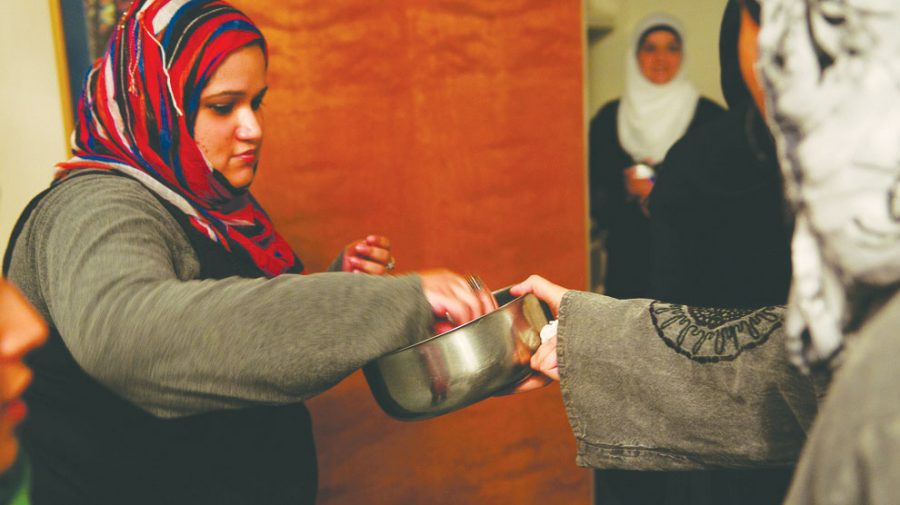In a non-descript red brick building on Bryant Drive that most students would merely pass by, a small community of students and Tuscaloosa families share food, prayer and unity. The only thing making the building stand apart is a small Islamic star and crescent at its top and a small sign reading Islamic Center of Tuscaloosa.
The University has a little-known Muslim Student Association, which had its first meeting Monday night. The group hasn’t yet determined a meeting schedule but will meet on a regular basis.
Recently, many students from the MSA have been meeting every night for nearly a month to break the daily fast for Ramadan, the Islamic month of fasting.
Students from the MSA and other local Muslim residents from all over the world, including Kuwait, Egypt, Oman, Pakistan, Bangladesh and India, gathered together last night to share a date and a bottle of water to break the fast at sundown.
After breaking the fast, the men and the women each answered the call to prayer separately and then ate dinner separately as well to give each other privacy.
Farah Majid, a third-year law student and the president of the Muslim Student Association, said her life as a Muslim student at the University is just the same as anybody else’s, although it can be a bit different during Ramadan.
There is a call to prayer five times a day, every day of the year, if you practice Islam. Majid said this doesn’t usually interfere with everyday life, and the only thing that can make things different is the fasting during Ramadan.
“We wake up at first prayer, which is usually right before daybreak,” Majid said. “[During Ramadan] you usually eat whatever you want at that time and then you go about your day normally. The other four calls to prayer are around noon, mid-noon, right after sunset and then one at night.”
Majid said she usually goes home to pray, but if there is a schedule conflict and she is unable to go home, she can make up that time later or pray in a small private place like an empty classroom.
Majid said as of now the MSA is a small organization.
“We are definitely a minority here in Alabama,” she said. “However, I have faced a lot of tolerance. People have never asked questions or made me feel uncomfortable. Some people are just uninformed, but never intolerant.”
Majid said the MSA’s events are open to everyone, and one of their main concerns is to educate the student body on Islam.
“We’re doing events for the interest of everyone,” she said. “If people don’t know a lot about Islam, they can learn more.”
There will be information tables during lunchtime at the Ferguson Center where students can ask questions, Majid said. Other upcoming events have not been finalized, but the MSA is planning interfaith events with organizations such as Hillel, Campus Ministries and the Indian Student Association.
Sarah Alhouti, a second year doctoral student in marketing, said she only joined the MSA last week, but she loves the feeling of having two communities to be a part of.
“In general I feel like you,” Alhouti said. “I live like everybody else. But while I am just like any other student and part of their community, I do have another community to come to. We support each other and help each other. This community is very caring; everybody has everybody’s back. Even if you are not Muslim, we are there for you, and it is great to have a group that genuinely cares about one another.”
Alhouti also said she believes that education is very important.
“I would recommend that students come to our meetings and events, especially right now,” Alhouti said. “Everybody is so easily influenced by the media. There is a lot of mystery surrounding our religion. People should make their opinion about our religion after experiencing it and being around it.”
Sohail Ahmed, a senior majoring in finance and economics, said it’s good to get to know somebody at the MSA.
“A lot of students want to understand and we want to help them learn about Islam,” Ahmed said. “I think it is a very beautiful religion and many people don’t know that there are a lot of similarities between Judaism and Christianity and Islam, such as the basic code on life, family and friends.”
The MSA and other Muslim Tuscaloosa residents shared dinner and conversation for the rest of the evening while children played outside.
“We like it when people are curious,” Ahmed said. “Come to the meetings. Ask questions and learn more.”









